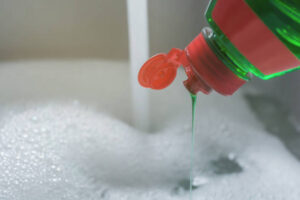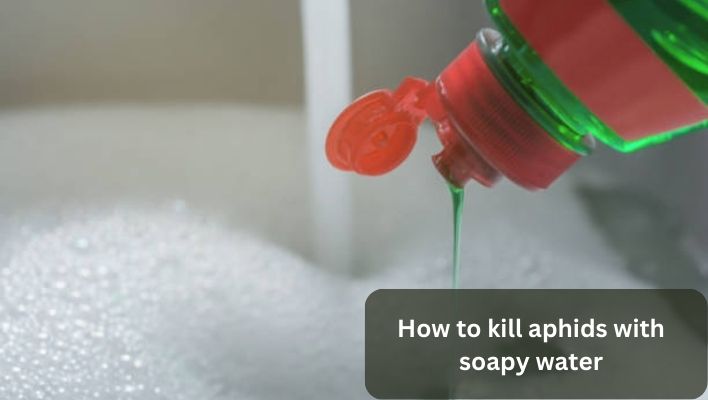Are you tired of dealing with pesky aphids on your plants? Well, have no fear because there is a simple and natural solution for you. All you need is a few household ingredients to make a homemade soapy water solution to kill those aphids for good.
Aphids are small insects that feed on plants and may cause damage to crops, shrubs, or trees. They are also found in abundance on plants around homes and gardens, especially if they have been left uncared for or if there is a very large population of aphids nearby.
They are also a nuisance to gardeners because they can transmit disease. Aphids reproduce asexually. They can produce up to seven generations in one year, each less capable than the one that came before.
There are several methods that can be used to treat aphids. Some will work better than others, depending on the aphid species’ size and location. Soap is one of the most effective ways to get rid of aphids. This is because soaps kill them by dissolving their exoskeleton.
In this blog, we will walk you through the steps to effectively use this method to get rid of aphids on your plants. So, keep reading if you’re ready to say goodbye to those pesky insects.
Can soapy water kill aphids?
Most soaps are not specifically formulated to kill insects. However, they can be used as makeshift insecticides in a pinch. The active ingredient in dish soap is usually a surfactant, which can disrupt the surface tension of water and help to remove dirt and grime from dishes.
When used on plants, the surfactants in soap can interfere with the insects’ ability to breathe and absorb water, ultimately leading to their death.
The soap disrupts the aphids’ cell membranes, causing them to dehydrate and die. The reason is simple; soapy water has a lot of alkalines, which is what eliminates aphids.
Alkalinity is the opposite of acidity, and when you have an alkaline solution (like soap), it will be harsher on the aphid than a slightly acidic solution.
It is important to use caution when using dish soap as an insecticide, as it can also harm plants if used in excess. It is generally a good idea to test a small area of the plant first to make sure it does not cause any damage.
However, insecticidal soaps and horticultural oils are the most effective way to get rid of aphids. Insecticidal soaps kill insects on contact, while horticultural oils are designed to kill aphids and other pests without touching them directly. Both are effective in killing aphids when used properly.

Killing aphids with soapy water
Aphids can be controlled by using a homemade soap spray. Mix a few drops of dish soap with water in a spray bottle to make the spray. Thoroughly coat the plants with the soap solution, making sure to get the undersides of the leaves where aphids often hide.
The soap will kill the aphids by disrupting their cell membranes. Be sure to test a small area of the plant before applying the spray to the entire plant, as some plants may be sensitive to the soap.
You should also be aware that while the soap will kill the aphids, it will not affect the eggs. Therefore, you may need to reapply the spray in a week or so to kill any newly hatched aphids. The soapy water will also make it harder for aphids to reproduce.
You can use any soap, but dish soap works best. Because dish soap is made from surfactants, it contains chemicals that help eliminate insects on plant leaves.
To use this method, mix some dish soap with water in a spray bottle and spray it directly onto your plants’ leaves. You can also use this method on indoor plants or any other area where you see aphids congregating.
Process:
To mix soap with water to kill aphids, you will need to use a liquid dish soap that contains a compound called sodium lauryl sulfate. This compound effectively breaks down the protective coating on the aphids’ bodies, which can cause them to die from dehydration.
Here is a simple recipe for making a soap spray to kill aphids:
Ingredients:
- 1 teaspoon of liquid dish soap
- 1 quart of water
Instructions:
- Fill a clean spray bottle with 1 quart of water.
- Add 1 teaspoon of liquid dish soap to the water.
- Shake the bottle gently to mix the soap and water.
- Spray the solution directly on the aphids and the plants they are infesting. Be sure to cover the underside of the leaves, as this is where aphids often hide.
- Repeat the treatment every 3-4 days until the aphids are no longer present.
How long does it take for soap to kill Aphids?
Soap can be effective at killing aphids when it is used properly. When applied directly to the aphids, the soap will disrupt the insects’ outer membrane and cause them to dehydrate. The exact amount of time it takes for the soap to kill the aphids will depend on the concentration of the soap solution and the size.
In general, soap should only take a few hours to kill the aphids. However, it is important to note that soap is only effective at killing the aphids with which it comes into direct contact. If you have a large infestation of aphids, you may need to repeat the treatment several times to control the population fully.
The soap will help kill the aphids and stop them from spreading from plant to plant. If you have many aphids, you will need more than one treatment before they go completely. Soap can take as long as a week to kill all of them off completely, but it will work.
Vinegar and dish soap for aphids
Several methods can kill aphids without pesticides or other harmful chemicals. Vinegar is one of the most effective ways of eliminating aphids because it kills them by dehydrating them and suffocating them with its acidic properties; however, it’s important not to use too much vinegar.
As stated above, dish soap works well against aphids because it disrupts their natural defense systems by interfering with their ability to produce waxes and oils that protect them from predators. The combination of these two substances will make an effective insecticide.
Vinegar is a great choice because it contains acetic acid, which can kill aphids quickly and effectively. To mix vinegar and soapy water, you will need the following:
- A spray bottle
- 1 cup of white vinegar
- 5 cups of water
- 1 tablespoon of liquid dish soap
To make the mixture, follow these steps:
- Pour the vinegar and water into the spray bottle.
- Add the liquid dish soap to the spray bottle and shake well to combine.
- Spray the mixture directly onto the aphids and their habitat (such as plants or trees) to kill them.
- Repeat the process every few days until the aphids are gone.
Note: Be sure to test the mixture on a small, inconspicuous area of the plant first to ensure it does not harm the plant. Also, be careful not to spray the mixture on beneficial insects, such as ladybugs or lacewings, as they help to control aphid populations.
Effects of soapy water on plants
Soapy water comprises many compounds, including sodium sulfate, chloride, and hydroxide. These compounds are commonly used in laundry products and other household cleaners. Soapy water can harm plants because it contains an alkaline pH value, damaging plant tissue more than acidic pH values (pH<7).
The alkalinity of soap depends on the amount of salt used in its manufacture, which means that soap manufacturers add more salt when they manufacture their products than when they manufacture non-soap products such as detergents or bleach.
The effects of soapy water on plants are varied, depending on the plant and how it reacts to the change. Some plants can handle soapy water better than others, but most will not be harmed. In general, plants grown in soil tend to be more stable and able to withstand a little bit of soap.
However, plants grown in pots or other containers should be treated with care because they may be more susceptible to getting hurt by soap.
Some plants have natural oils that can protect them from soap damage, so they will likely not suffer any ill effects from exposure to it. Other plants may have oils sensitive to soap and should be avoided altogether when using it in your garden.
Soapy water can be used as a plant fertilizer, but there are better choices. Soap is composed of fatty acids and other ingredients that are too harsh for plants. Instead, use a diluted mixture of water and soap to clean your greenery.
Other homemade sprays for aphids
There are other homemade sprays you can use to get rid of aphids without resulting in the use of dangerous pesticides. Below are some homemade proven methods you can use in alternative to soapy water
- Garlic and onion spray: Blend equal parts garlic and onion with a few cups of water and let sit for a few hours. Strain the mixture and add a few drops of dish soap to help the solution stick to the leaves. Spray the mixture directly on the aphids.
- Neem oil spray: Mix a few teaspoons of neem oil with water and a few drops of dish soap in a spray bottle. Spray the mixture directly on the aphids.
- Horseradish and water spray: Blend a few tablespoons of grated horseradish with a few cups of water and sit for a few hours. Strain the mixture and add a few drops of dish soap to help the solution stick to the leaves. Spray the mixture directly on the aphids.
- Hot pepper spray: Capsaicin, the active compound in hot peppers, is toxic to aphids. To make a hot pepper spray, blend a few hot peppers with water and strain the solids. Mix the liquid with a few drops of dish soap and spray it on your plants.
- Lemon and water spray: Mix a few tablespoons of lemon juice with a few cups of water and a few drops of dish soap in a spray bottle. Spray the mixture directly on the aphids.
It’s important to test any homemade spray on a small area of the plant before applying it to the entire plant, as some plants may be sensitive to these solutions.
